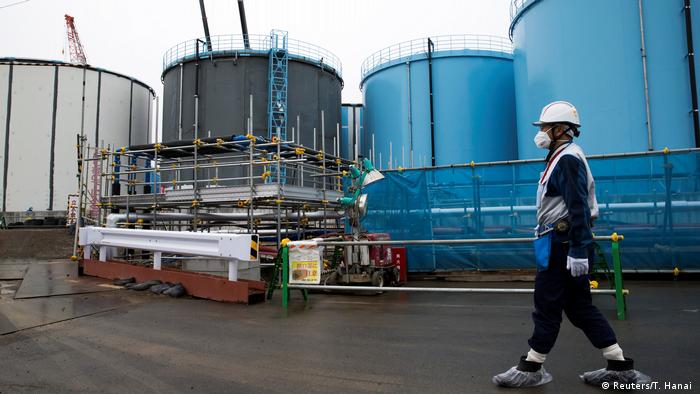 An employee walks past storage tanks for contaminated water at Tokyo Electric Power Co.'s (TEPCO) Fukushima Dai-ichi nuclear power plant in Okuma, Fukushima, Japan, on Thursday, Feb. 23, 2017. The sixth anniversary of the massive earthquake and tsunami that caused the meltdown at the TEPCO facility is on March 11. Photographer: Tomohiro Ohsumi/Bloomberg , Bloomberg
An employee walks past storage tanks for contaminated water at Tokyo Electric Power Co.'s (TEPCO) Fukushima Dai-ichi nuclear power plant in Okuma, Fukushima, Japan, on Thursday, Feb. 23, 2017. The sixth anniversary of the massive earthquake and tsunami that caused the meltdown at the TEPCO facility is on March 11. Photographer: Tomohiro Ohsumi/Bloomberg , Bloomberg
For the first time in more than a decade, a narrow majority of Japanese now support restarting idled nuclear reactors, according to a poll in the country’s top business newspaper.
The survey result marks the first time since the Fukushima disaster in 2011 that an increasing role for nuclear has been favored. It comes amid surging power prices and warnings of electricity shortages in Tokyo.
Some 53% of people said nuclear reactors should restart, if safety can be ensured, while 38% said they should remain shut, according to the poll conducted by the Nikkei. That’s up from 44% support for the restarts in a similar survey in September. The newspaper has been conducting semi-regular polls on the issue for more than a decade.
Japanese public opinion moved decisively against atomic power after the 2011 earthquake and tsunami resulted in the meltdown of three reactors at Fukushima, with most of the country’s operable nuclear reactors remaining shut. Russia’s invasion of Ukraine has pushed up energy prices globally, however, and a recent tremor in Japan took several gas- and coal-fired plants offline, leading to the first-ever electricity supply alert for Tokyo.
“There is a strong tailwind for nuclear power at this moment,” Nobuo Tanaka, a former executive director of the International Energy Agency, said in a Bloomberg TV interview on Monday. If Japan restarts nuclear, the country’s utilities could re-sell spare liquefied natural gas to Europe, he said.
Japan is the world’s second-biggest LNG importer, so a revival in atomic power there would have a big impact on global gas markets. Countries from South Korea to Belgium have been reassessing the role of nuclear to help speed the transition away from fossil fuels, with the war in Europe making atomic power look even more attractive.
Only 10 nuclear reactors have been restarted under post-Fukushima safety rules, but Japan’s 2030 energy goals requires nearly all 33 of them to be back online eventually. A small group of politicians from both the ruling party and opposition are calling for this to happen faster, but the restarts face hurdles including getting local government approval and a formal safety nod from the national regulator.
